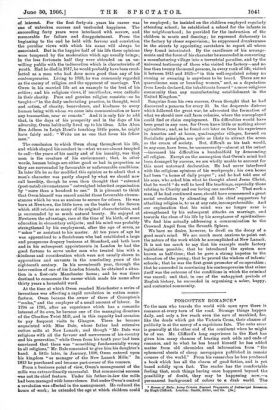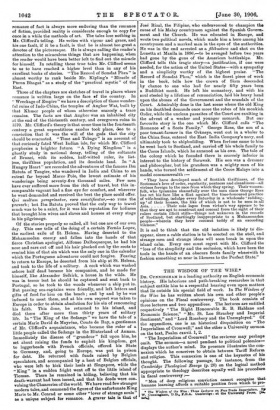FORGOTTEN ROMANCE.*
To the man who travels the world with open eyes there is romance at every turn of the road. Strange things happen daily, and only a few reach even the ears of mankind, for, like the deeds which get the Victoria Cross, their chance of publicity is at the mercy of a capricious fate. The vales sacer is generally at the other end of the continent when he might be of use. Mr. Clifford's long experience in the East has given him many chances of hearing such odds and ends of romance, and to what he has heard himself he has added matter from old chronicles and information from " the ephemeral sheets of cheap newspapers published in remote corners of the world." From his researches he has produced a book which has all the charm of good fiction, and is yet based solidly upon fact. The reader has the comfortable feeling that, such things having once happened beyond the possibility of doubt, they may be happening now,—a permanent background of colour to a drab world. The • Heron of Saila : beim eortais Rama Fragments of Submerged Somance, By Hugh Clifford. London; Smith, Elder, and Co. Os.]
romance of fact is always more enduring than the romance of fiction, provided reality is considerate enough to copy for once in a while the methods of art. The tales lose nothing in Mr. Clifford's telling. He writes with vigour and grace, and his one fault, if it be a fault, is that he is almost too great a devotee of the picturesque. He is always calling the reader's attention to the miraculous things that are happening, when the reader would have been better left to find out the miracle for himself. In retelling these true tales Mr. Clifford seems
to us to have reached a higher level than in any of his excellent books of stories. " The Record of Somdat Phra" is
almost worthy to rank beside Mr. Kipling's " Miracle of Ptrun Bhagat" as a study of the " practical mystic " of the East.
Three of the chapters are sketches of travel in places where romance is written large on the face of the country. In " Wreckage of Empire " we have a description of those wonder- ful ruins of Indo-China, the temples of Angkor Wat, built by that Khmer people of whom otherwise scarcely a trace remains. The facts are that Angkor was an inhabited city at the end of the thirteenth century, and overgrown ruins in 1570. Mr. Clifford's theory is that some time in the fourteenth century a great superstitious exodus took place, doe to a conviction that it was the will of the gods that the city should be evacuated. " Time and Tobago" is an account of that curiously fated West Indian isle, for which Mr. Clifford prophesies a brighter future. "A Dying Kingdom" is a ghastly study in national decay, telling of the sultanate of Brunei, with its sodden, half-witted ruler, its list- less, thriftless population, and its desolate land. In " A Hungry Heart" are recorded the adventures of the famous Ibn Batuta of Tangier, who wandered in India and China to an extent far beyond Marco Polo, the lowest estimate of his wanderings being seventy-five thousand miles. Few men have ever suffered more from the itch of travel, but this in• comparable vagrant had a fine eye for comfort, and wherever he went demanded and received the best the place could offer. Qui multum peregrinatur, raro sanctificatur,—so runs the proverb ; but Ibn Batuta proved that the only way to travel much was to be a saint, for it was his reputation for holiness that brought him wives and slaves and houses at every stage in his pilgrimage.
Of the stories properly so called, all but one are of our own day. This one tells of the doing of a certain Fernao Lopez, the earliest exile of St. Helena. Having deserted to the Mohammedan enemy and fallen into the hands of that fierce Christian apologist, Alfonso Dalboquerque, he had his nose and ears cut off and his hair plucked out by the roots to remind him of that sin which was the only one in the calendar which the Portuguese adventurer could not forgive. Fearing to return to Europe, he deserted from his ship at St. Helena, and took to the life of a solitary. A cock which was washed ashore half dead became his companion, and he made for himself, like Alexander Selkirk, a house in the wilds. He was in terror lest he should be captured and sent back to Portugal, so he took to the woods whenever a ship put in. But passing sea-captains were friendly, and left letters and gifts of food for him on the beach ; and by and by he was induced to meet them, and at his own request was taken to Europe in order to obtain absolution for his sin of renouncing his faith. This done, he returned to his island, and died there after more than thirty years of solitary life. In "The King of the Sedangs" we have the tale of a certain Marie David de Mayrena, Comte de Ray, a gentleman of Mr. Clifford's acquaintance, who became the ruler of a little people called the Sedangs in the Hinterland of Annam. Immediately the disease of " grandeur " fell upon him, he set about raising the funds to exploit his kingdom, got to loggerheads with French officials, offered his State to Germany, and, going to Europe, was put in prison for debt. He returned with funds raised by Belgian speculators, and accompanied by a host of Belgian officials, who were left to kick their heels at Singapore, while the "King" in a sudden fright went off to the little island of Tioman. There he remained in hiding, believing that his death-warrant had been issued, and that his deeds were con- vulsing the Chanceries of the world. We have read few stranger modern tales, and commend the figure of the unfortunate King Marie to Mr. Conrad or some other "lover of strange souls" as a unique subject for romance. A graver tale is that of
Jose Rizal, the Filipino, who endeavoured to champion the cause of his Malay countrymen against the Spanish Govern-
ment and the Church. He was educated in Europe, and wrote two political novels, which made him a hero among his countrymen and a marked man in the eyes of the authorities. He was in the end arrested as a filibustero and shot on the Lunetta at Manila in 1896,—to be avenged before two years had gone by the guns of the American battleships. Mr. Clifford tells this tragic story—a justification, if one were needed, for the action of the United States—with a sympathy and a simplicity worthy of the highest praise. " The Record of Somdat Phra," which is the finest piece of work in the book, tells how the crown of Siam descended by chance to one who had for nearly fifty years been a Buddhist monk. He left his monastery, and with his soul steeled by a lifetime of renunciation, laid his heavy hand upon the abuses of the Government and the scandals of the Court. Admirably done is the last scene where the old King on his deathbed demands once more the robes of his monkish Order, while the unclean parasites of the Court are exulting in the advent of a weaker and younger monarch. But our favourite story is the one which Mr. Clifford calls " The
Romance of a Scots Family." George Ross, the son of a poor tenant-farmer in the Orkneys, went out in a whaler to
the China Seas, entered the East India Company's navy, and ultimately took to shipbuilding. When fortune came to him he went back to Scotland, and carried off his whole family to the Cocos Islands, which he annexed as his own. The tale of the colony which he founded there is scarcely inferior in interest to the history of Sarawak. His son was a dreamer and philosopher, but his grandson was a mighty man of his hands, who turned the settlement of the Cocos Malaya into a model commonwealth :-
"They have developed much of Scottish thriftiness, of the Scotsman's love of order, regularity, neatness and cleanliness—all virtues foreign to the race from which they spring. Their women- folk, who tyrannise shamefully over the men since George Ross has set his face like a flint against the time-honoured practice of wife-beating, indulge every Saturday in a wholesale • redding- up ' of their houses, the like of which is not to be seen in all Asia Their sole lapse from virtue's way appears to be that they are apt to construct and conceal from the sight of their rulers certain illicit stills—things not unknown in the records of Scotland, but startlingly inappropriate to a Muhammadan people—wherein they brew coconut toddy of an exceeding vileness."
It is sad to think that the old isolation is likely to dis- appear, since a cable station is to be erected on the atoll, and strange men and strange ideas will soon break in upon the island calm. Every one must regret with Mr. Clifford the "loss of the simplicity and the seclusion, which have been the tools in the hands of an obscure Scots family wherewith to fashion something so near in likeness to the Perfect State."



























































 Previous page
Previous page